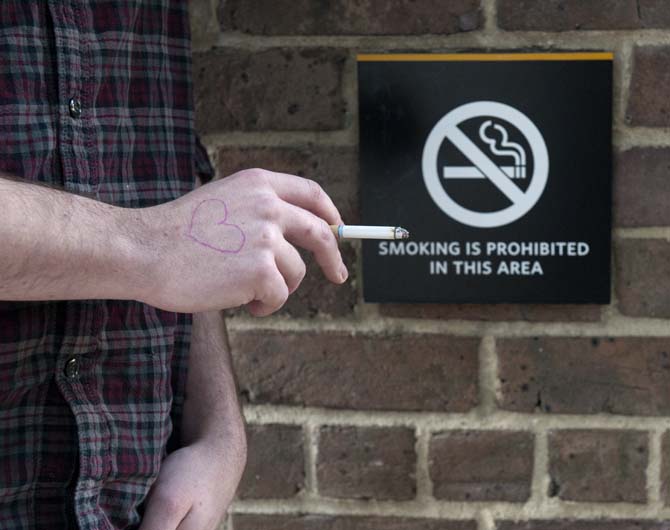Tomorrow, the University’s Student Government will meet to decide whether everyone’s favorite guilty pleasure should be allowed on campus. No, I’m not talking about binge-watching Netflix and eating ice cream from the carton, I’m talking about tobacco use.
The state passed a law that requires public post-secondary education institutions to develop smoke-free policies for its campuses by August of this year. SG has taken this one step further, gauging the interests of the LSU community in making the ban apply to all tobacco products.
I’m not a smoker, but I’m also not opposed to others smoking around me. Even if I was, I would realize that when attending a school with 30,000 students, my personal opinion of smoking would be irrelevant.
The nation has reached an all-time low in the number of incoming college freshmen who are smokers, according to a survey of American freshman by the Higher Education Research Institute — down from a spike of 12.7 percent in 1998 to 2.6 percent in 2012. So at this point, the ruling theoretically affects a small portion of University’s students.
Arguments against tobacco often focus on the negative effect it has on the user. Proponents of this line of reasoning occupy LSU’s campus and believe that enacting this ban would be a move to better the health of students.
These advocates should also push for the removal of McDonald’s, Papa John’s and Chick-fil-A. One in 10 American adults suffer from Type 2 diabetes and three in 10 college students suffers from obesity, with the vast majority not eating enough fruit or vegetable servings a day.
I’m not here to debate the affect that tobacco has on the human body — that’s not my job. However, there are several other things on LSU’s campus that present major risks to overall student health.
Take for instance the hit and run that occurred on Dalrymple Drive last semester. Should we ban driving on campus?
You probably immediately answered a resounding “no” to that because you’d realize how inconvenient that would be for both students and faculty members.
Second-hand smoke affects non-smokers’ health, but doesn’t my driving affect other students’ health in a more lethal way?
Wouldn’t the ubiquitous ashtrays attached to trash cans on campus just taunt the smokers who would then have no use for them anymore? Or should we waste money filling the ashtrays in with cement or potting plants in them?
The tobacco ban would be useless. There’s no way to police smokers or dippers on campus. Even if there was, it would be an obvious waste of the LSU Police Department’s time and resources.
This would lead to what I think is the most annoying implication of the tobacco ban — peer enforcement.
In a nutshell, this means that pesky students who are personally offended at others’ dipping or smoking will attempt to enforce the ban by themselves — or, what these people already do to smokers and dippers on campus.
People’s personal preferences for what they find annoying should not influence the law. If this was the case, I’d lobby to ban kids in tie-dye shirts skateboarding through the Quad. Effectively enforcing the tobacco ban is nearly impossible. It is also a baseless move to make LSU’s campus fit in with the 1,182 other American universities that have gone entirely smoke-free. It’s like an after-school special, with LSU submitting to peer pressure.
Upon researching this issue, I stumbled upon the term “nonsmoker’s rights” for the very first time. Is there something about smokers and dippers that make them unworthy of their own rights?
Everyone has their faults that are bothersome to others, but why should we be punished for them? I could annoyingly click my pen throughout the entirety of my spring semester courses. The liberty I have to do that shouldn’t be infringed upon because of others’ disdain for it.
SidneyRose Reynen is an 18-year-old film and art history freshman from New Orleans.








